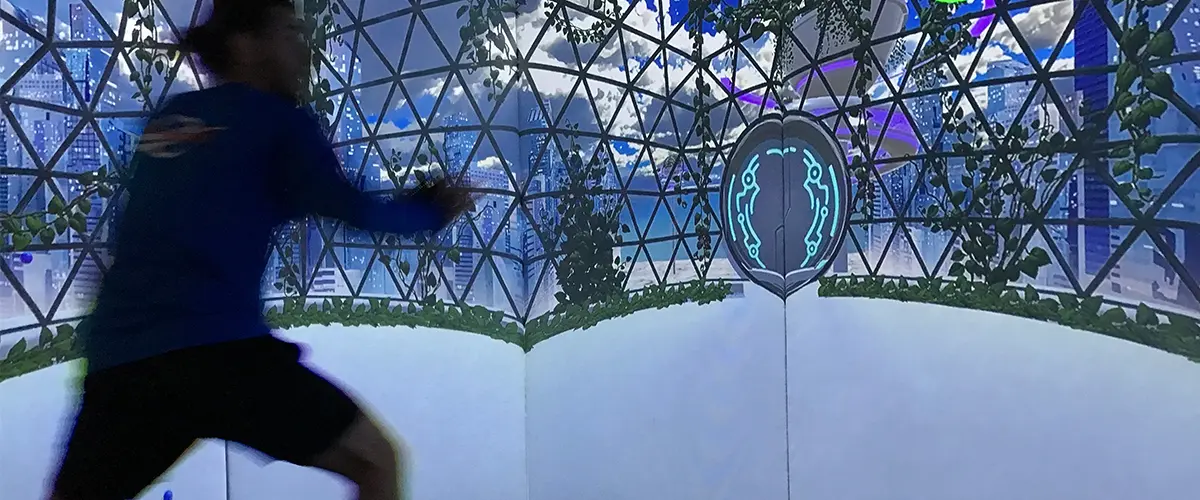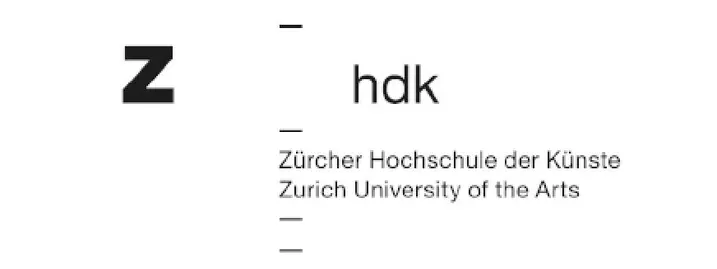ExerUP!: Design and Evaluation of a Digital Exergame-Based Solution for Effective and Attractive Sports Rehabilitation
Exergaming combines physical exercise with entertaining, motivating, and challenging games. The ExerCube offers optimal physical and cognitive challenges which could also benefit sports rehabilitation. In this study, we explore the potential of the ExerCube during rehabilitation after knee injury.

Background
The digital transformation is having a lasting impact on how we live and move. Whether in prevention or rehabilitation – new technologies are revolutionizing the traditional offering of customized solutions for a beneficial and future-oriented range of digital training and therapy services. In this context, the design for and with the end-users and stakeholders, as well as questions about the optimal design of high-quality, attractive, and effective tools take on a central role. However, on both the product side as well as the research side, many questions and processes have not yet been tapped, and so the potential of these digital solutions often remains unexploited.
Objective
Therefore, the goal of this R&D work is the research-based and user-centered co-creation of immersive, digital exergame scenarios that are safe to perform during rehabilitation after musculoskeletal injury. Further, the potential of digitized training and rehabilitation in home and therapeutic settings will be explored.
The following objectives will be addressed in this project:
- User-centered and research-based development of specific exergame scenarios for rehabilitation after anterior cruciate ligament (ACL) injuries that are effective, attractive, and safe to use, and that extend and set on the existing ExerCube design.
- Evaluation of the efficacy and attractiveness of ExerCube training during the rehabilitation of athletes after anterior cruciate ligament injuries regarding physical and cognitive performance.
- Dissemination of the R&D results via all partners and start of distribution by Sphery.
Methods and Procedure
The project will be structure into the following work-packages (WPs):
WP1: Motor performance during ExerCube training, Lead: ZHAW, Michelle Haas
The goal is to identify movement patterns that are known risk factors for musculoskeletal LEx injuries occurring during ExerCube training in healthy and injured athletes. The biomechanics of the LEx will be recorded during ExerCube trainings of female and male athletes. First, data will be recorded on healthy athletes; based on their data as well as the results of a previously completed Master thesis, the movements with the highest risk of LEx (re-)injuries will be excluded from the ExerCube training of the athletes during rehabilitation after ACL injury. The main outcome of WP1 is the knowledge of which motion tasks pose risk for LEx injuries and which tasks are safe during rehabilitation.
WP2: User requirements for rehabilitative ExerCube use, Lead: ZHAW, Prof. Dr. Eveline Graf
The expectations and demands of the future users of the ExerCube in a rehabilitative setting (athletes, physical therapists, sports physicians) will be assessed following user-centered design principles. The digitalization of rehabilitative training allows gathering a tremendous amount of data which needs to be made accessible and useful to the users. Using both quantitative and qualitative research methods, the key result of this WP will be a catalogue of user requirements regarding the application of the ExerCube in rehabilitative settings.
WP3: Rehabilitation specific motivating workout scenarios for the ExerCube, Lead: ZHdK, Dr. Anna Lisa Martin-Niedecken and Sphery AG, Stephan Niedecken
Incorporating both the results of WPs 1 and 2, rehabilitation specific workout scenarios will be explored and implemented in collaboration with developers at Sphery Ltd as well as game researchers at ZHdK. Using an iterative, user-centered and research-based approach for the implementation of the user requirements and motivational meaningful designs, including repeated pilot testing with the target population, will ensure an effective and attractive result. The final workout scenario will be pilot tested involving both athletes and health care professionals.
WP4: Efficacy and attractiveness of the ExerCube training during rehabilitation, Lead: ZHAW, Prof. Dr. Eveline Graf and ZHdK, Dr. Anna Lisa Martin-Niedecken
The exergame scenarios developed in WP3 will be examined for their efficacy and attractiveness to improve both physical and cognitive performance during rehabilitation after LEx injury. Participants, who will all be in the last stage of rehabilitation after ACL injury, will be assigned to one of three groups: ExerCube, @home version of ExerCube, and control. While the control group will undergo standard rehabilitation, the ExerCube and @home ExerCube groups will perform ExerCube trainings in the assigned setting. Using assessments to evaluate physical as well as cognitive performance, the effect of the ExerCube will be explored. Additionally, questionnaires and interviews about motivation 3 and the analysis of adherence will provide insights about differences in the acceptance of ExerCube training at home, in the therapeutic setting and in general.
WP5: Public outreach and dissemination, Lead: ZHAW, Prof. Dr. Eveline Graf and ZHdK, Dr. Anna Lisa Martin-Niedecken
After completion of the R&D work, all project partners will jointly disseminate the results through various channels. Among others, workshops with health professionals, therapists and educational institutions are planned to inform and inspire about the use of the newly developed application in the field of sports therapy. The results will be presented at congresses and trade fairs to an expert audience as well as to the public. Sphery will also start distributing the newly developed features.
Project Partners
Project Organisation
- Project leadership
Prof. Dr. Eveline Graf - Project duration
2021 - 2023 - Project team ZHAW Departement Gesundheit
Michelle Haas - Project team ZHdK Departement Design
Dr. Anna Lisa Martin-Niedecken, Larissa Wild, Leander Schneeberger - Sphery AG
Stephan Niedecken - Partner
Win 4 - Funding
Digitalisierungsinitiative der Zürcher Hochschulen (DIZH) - Project status
Completed
Publications and reports
- 3rd January 2024, Tele Top film clip
Game hilft bei Kreuzbandriss-Reha - 30th November 2023, ZHAW news and press release
Gamen hilft bei der Rehabilitation von Kreuzbandrissen - 19th September 2023, ZHAW Impact
Mehr Spass beim Üben - 1st June 2023, Film clip Digitalization Initiative of the Zurich Higher Education Institutions, DIZH
Film clip: ExerUP! Forschungsbasierte Entwicklung eines Exergames für die Sportrehabilitation - 1st June 2022, Medica Magazin
Rehabilitation after sports injury: Gamification of exercises in the ExerCube
Interview with Dr. Eveline Graf on medica.de - 3 - 5 February 2022, Scandinavian Sports Medicine Congress, Copenhagen
Haas, Michelle; Rausch, Anne-Kathrin; Graf, Eveline, 2022. Biomechanical analysis of selected risk factors for an anterior cruciate ligament (ACL) rupture during training with the ExerCube [Poster].
ZHAW publication database
-
Graf, Eveline; Martin-Niedecken, Anna; Haas, Michelle,
2024.
Therapie mit Spiel und Spaß : ein neu entwickeltes Exergame zur Knierehabilitation.
pt Zeitschrift für Physiotherapeuten.
76(6), pp. 38-43.
Available from: https://doi.org/10.21256/zhaw-30934
-
Haas, Michelle; Martin-Niedecken, Anna L.; Wild, Larissa; Schneeberger, Leander; Graf, Eveline,
2024.
In:
15th Annual Conference of the Swiss Society of Sports Sciences, February 7 and 8, 2024, at ETH Zurich: Approaches in Sports Sciences: Today and Tomorrow. Book of Abstracts.
15th Annual Conference of the Swiss Society of Sports Sciences, Zurich, Switzerland, 7-8 February 2024.
Bern Open Publishing.
pp. 045.
Current Issues in Sport Science.
Available from: https://doi.org/10.36950/2024.2ciss045
-
Haas, Michelle; Martin-Niedecken, Anna L.; Wild, Larissa; Schneeberger, Leander; Graf, Eveline,
2024.
In:
15th Annual Conference of the Swiss Society of Sports Sciences, February 7 and 8, 2024, at ETH Zurich: Approaches in Sports Sciences: Today and Tomorrow. Book of Abstracts.
15th Annual Conference of the Swiss Society of Sports Sciences, Zurich, Switzerland, 7 - 8 February 2024.
Bern Open Publishing.
Available from: https://doi.org/10.36950/2024.2ciss044
-
Haas, Michelle; Martin-Niedecken, Anna-Lisa; Wild, Larissa; Schneeberger, Leander; Graf, Eveline,
2024.
Intra- and inter-subject variability in a realistic, non-standardized exergaming scenario [paper].
In:
ISBS Proceedings Archive.
42nd International Society of Biomechanics in Sports Conference (ISBS), Salzburg, Austria, 15-19 July 2024.
Northern Michigan University.
pp. 350-355.
Available from: https://doi.org/10.21256/zhaw-31220
-
Haas, Michelle; Martin-Niedecken, Anna Lisa; Wild, Larissa; Schneeberger, Leander; Graf, Eveline,
2023.
Biomechanische Analyse von Risikofaktoren für Knieverletzungen während eines Exergame-Trainings.
In:
dvs Sportwissenschaftlicher Hochschultag, Bochum, Deutschland, 20.-22. September 2023.
-
Martin-Niedecken, Anna Lisa; Haas, Michelle; Sascha, Ketelhut; Graf, Eveline,
2023.
Exergames – innovative Trainingsansätze für Prävention, Rehabilitation und Sport!?.
In:
dvs Sportwissenschaftlicher Hochschultag, Bochum, Deutschland, 20.-22. September 2023.
-
Graf, Eveline; Haas, Michelle; Wild, Larissa; Schneeberger, Leander; Martin-Niedecken, Anna Lisa,
2023.
Forschungsbasiertes Exergame-Design für die Sportrehabilitation.
In:
dvs Sportwissenschaftlicher Hochschultag, Bochum, Deutschland, 20.-22. September 2023.
-
Haas, Michelle C.; Martin-Niedecken, Anna; Wild, Larissa; Schneeberger, Leander; Graf, Eveline S.,
2023.
In:
Scandinavian Sports Medicine Congress, Copenhagen, Denmark, 2-4 February 2023.
ZHAW Zürcher Hochschule für Angewandte Wissenschaften.
Available from: https://doi.org/10.21256/zhaw-26952
-
2020.
ETH Zurich.
Available from: https://doi.org/10.21256/zhaw-28312

